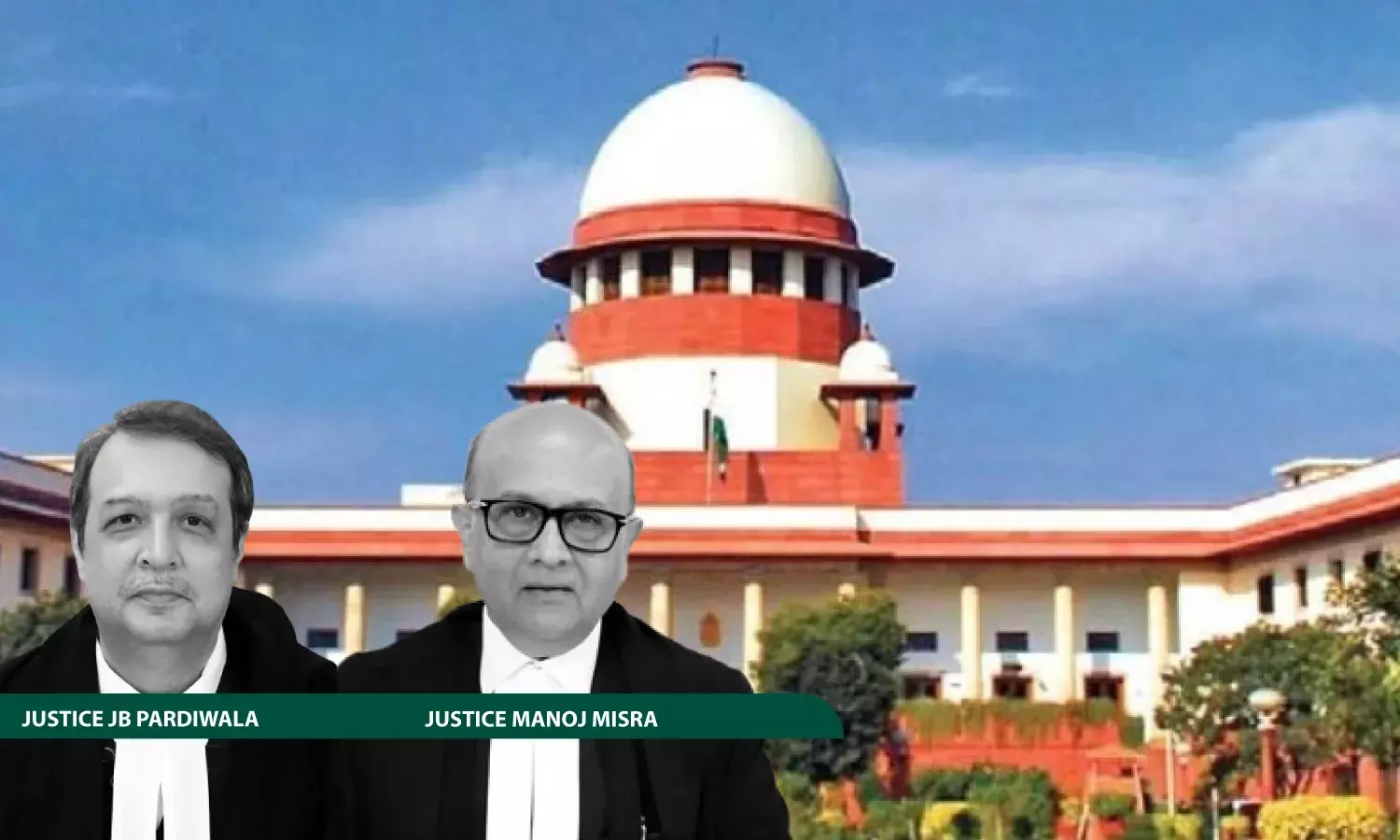Software Bought For Profit-Linked Business Automation Is A "Commercial Purpose": Supreme Court Upholds Dismissal Of Consumer Complaint
The Apex Court held that software purchased by a commercial entity to automate business processes connected to profit generation amounts to a transaction for a commercial purpose under the Consumer Protection Act, and therefore, the purchaser does not qualify as a consumer under Section 2(1)(d).

Justice J.B. Pardiwala, Justice Manoj Misra, Supreme Court
The Supreme Court has held that the purchase of software by a company for automating its business processes, where the dominant purpose is connected to profit generation, constitutes a commercial transaction under the Consumer Protection Act, 1986.
The Apex Court was hearing a civil appeal challenging the concurrent findings of the State Consumer Disputes Redressal Commission, Delhi, and the National Consumer Disputes Redressal Commission, both of which dismissed the complaint as not maintainable.
A Bench comprising Justice J.B. Pardiwala and Justice Manoj Misra upheld the view, observing: “In the instant case, not only the complainant is a commercial entity, the purchase of goods/services (i.e., software) from the respondent was with a view to automate the processes of the company which were linked to generation of profit inasmuch as automation of business processes is undertaken not just for better management of the business but to reduce costs and maximise profits. Thus, in our view, the transaction of purchase of goods/services (i.e., software) had a nexus with generation of profits and, therefore, qua that transaction the appellant cannot be considered a consumer as defined in Section 2(1)(d) of the 1986 Act.”
Senior Advocate Shashank Garg represented the appellants, while Senior Advocate Jayant Mehta appeared on behalf of the respondents.
Background
The appellant, a medical devices manufacturer engaged in import and export activities, purchased a software system from the respondent for automation of export–import documentation and related operational processes. Alleging that the software was defective and did not function as promised, the appellant sought a refund and compensation before the State Commission.
The State Commission dismissed the complaint on the ground that the software had been purchased for a commercial purpose. The National Commission affirmed this finding.
Before the Supreme Court, the appellant argued that the software was purchased “for self-use,” that it was not meant for resale, and that automation merely facilitated internal activities, which should not disqualify it from being considered a consumer.
Court’s Observation
The Supreme Court first examined the statutory definition of “consumer” under Section 2(1)(d) of the Consumer Protection Act, 1986. It reiterated that the provision excludes any person who purchases goods or avails services for a “commercial purpose,” except where the goods or services are used exclusively for earning a livelihood through self-employment.
To determine whether the transaction was commercial, the Court applied the “dominant purpose test,” holding that what matters is not the identity of the purchaser but whether the purchase has a direct nexus with profit-making activity.
The Bench relied on Lilavati Kirtilal Mehta Medical Trust v. Unique Shanti Developers and National Insurance Co. Ltd. v. Harsolia Motors, reaffirming that the determinative factor is whether the goods or services purchased are used for generating profit, improving operational efficiency, or expanding commercial activity. In contrast, purchases made for comfort or personal use (such as air conditioners or refrigerators) may fall outside the commercial-purpose exclusion.
Applying these principles, the Court held that the appellant’s purchase of software for automating export–import documentation was directly tied to business efficiency, cost reduction, and profit maximisation. The Bench noted that in commercial entities, automation is a business strategy aimed at reducing human error, improving speed, and enhancing profitability.
The Court then examined whether the appellant could seek shelter under the Explanation to Section 2(1)(d), which applies to those purchasing goods or services exclusively for earning a livelihood through self-employment. It held that this protection does not extend to companies or incorporated entities, which by their nature are formed to carry on business and generate profits.
The Bench noted that automation of an enterprise’s processes is fundamentally a business-expansion activity and cannot be equated with personal livelihood-based transactions, while stating: “There is a difference between a self-employed individual and a corporation. The goods purchased by a self-employed individual for self-use for generating livelihood would fall within the explanation even if activity of that person is to generate profits for the purpose of its livelihood. But where a company purchases a software for automating its processes, the object is to maximise profits and, therefore, it would not fall within the explanation of Section 2(1)(d) of the 1986 Act.”
Consequently, the Court concluded that the software purchase was a commercial transaction falling squarely outside the definition of “consumer.”
Conclusion
Holding that the dominant purpose of the software purchase was to improve business efficiency and enhance profit margins, the Supreme Court upheld the findings of the State and National Commissions.
The appeal was accordingly dismissed with no order as to costs.
Cause Title: M/s Poly Medicure Limited v. M/s Brillio Technologies Private Limited (Neutral Citation: 2025 INSC 1314)
Appearances:
Appellant: Senior Advocate Shashank Garg, with Advocates Divyakant Lahoti, AOR, Kartik Lahoti, Praveena Bisht, Vindhya Mehra, Kumar Vinayakam Gupta, and others
Respondent: Senior Advocate Jayant Mehta, with Advocates Ankur Sangal, Sucheta Roy, Raghu Vinayak Sinha, M/S. Khaitan & Co., AOR


